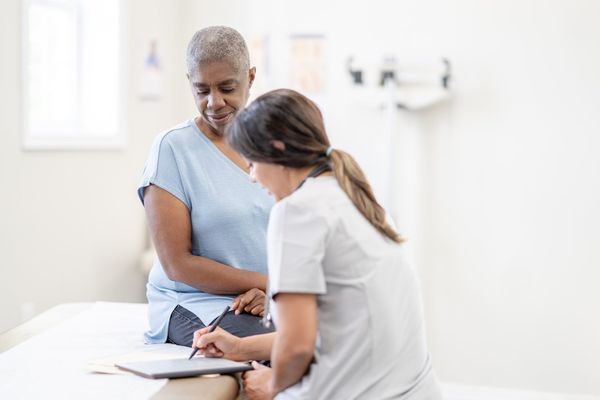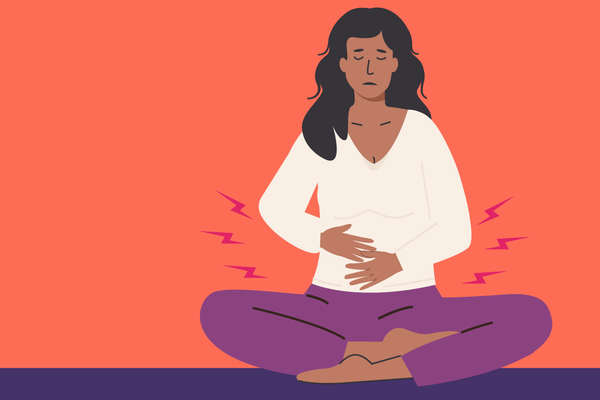As told to Nicole Audrey Spector
I noticed something was off when, despite tons of cardio, I started gaining weight. I also felt pressure in my lower abdomen — like there was a golf ball pressing inside my right side. And I could feel something when I pressed down on the area.
Concerned, I made an appointment with my OB-GYN. She examined me and said the bulging area was just muscle. Nothing to worry about. She weighed me and noted that I’d gained 10 pounds since my last routine exam six months before.
“You must like to eat a lot,” she said.
This struck me as a very weird thing for a doctor to say to a patient.
“I eat clean,” I said. “And I exercise every day.”
I asked her if it was possible to do a sonogram to further check out the area that she said was just muscle.
“That’s not necessary,” she said.
I was disappointed and a bit unnerved, but I left the appointment telling myself the doctor must be right. There was nothing to worry about. I was only 27 years old.
Six months later I did a Tough Mudder — a mud run and obstacle race that is very physically demanding. For a week after, I felt unusually tired. I figured I had just worked out too hard and didn’t think much of it.
Soon after, I did a half-marathon. Once it was over, I came down with a fever and began vomiting. My stomach bloated up. I looked like I was three months pregnant.
Immediately, I made an appointment with a gastroenterologist, thinking that my symptoms were related to a stomach issue, like acid reflux.
Practically as soon as he touched my abdomen, the gastroenterologist felt the bulge.
“You have a mass,” he said.
He ordered a CT scan for me, and referred me to another OB-GYN who ordered a transvaginal ultrasound. The ultrasound revealed a large mass in my right ovary. The CT scan report said it was consistent with malignancy, and it could be ovarian cancer.
The mass would have to be surgically removed right away and biopsied.
When I got home, I went down a rabbit hole trying to find a surgeon who could remove the mass and who accepted my health insurance. I found one, but he didn’t have any appointments for another month.
The next day, at work, I broke down crying to my boss. I told him about the procedure I needed. He suggested I visit his wife’s OB-GYN, who was able to see me ASAP. It turned out that OB-GYN didn’t take my insurance either, but I was so desperate to get the mass removed that I set up an appointment with him.
He recognized how severe my situation was and said he could perform the surgery. But the fact that he didn’t take my insurance made it a no-go. There was no way I could cover a serious surgery out of pocket.
I told the doctor the name of the other OB-GYN who took my insurance, but who wasn’t available for another month. It just so happened that he knew that doctor well, so he personally called him and got me squeezed in for surgery right away.
Ahead of the surgery, I had to sign paperwork consenting to the procedure — and what it might entail. Though incredibly nervous at the thought of it, I signed off on having my uterus, ovaries and fallopian tubes removed, which the OB-GYN told me would be necessary if the mass had spread to those areas. He was kind about it, but I was still terrified. I was, after all, still in my 20s and hadn’t yet decided whether or not I wanted children.
I was given the option to freeze my eggs, but honestly, the experience was already so traumatic that I just couldn’t handle going through another medical ordeal. I accepted that I may not be able to have children.
What got me through signing that terrifying consent form was understanding that this is what it would take to get answers and to begin my journey of healing.
Ahead of surgery, I was told that it would take about two hours to remove the mass in my ovary alone. If the mass had spread, the surgery would take longer.
My sister was there when I woke up, and the first thing I asked her was what time it was. Seven hours had gone by since I was put under anesthesia. I knew then that I probably had cancer.
Two weeks after the surgery, I had a follow-up with my doctor who gently explained to me that, as I’d feared, I did have ovarian cancer — and a particularly aggressive type that is typically only seen in women much older than I was. The mass weighed six pounds. To be free of it, my right ovary and right fallopian tube had been entirely removed. This was jarring to hear, but I was grateful that more wasn’t removed.
The ovarian cancer was stage 1 — but that didn’t mean my journey with cancer ended with the mass removal. My doctors explained to me that it would be best to undergo chemotherapy in case any microscopic cancer cells had spread.
I was very reluctant to agree to chemo, knowing how sick it was likely to make me, but the doctors were very clear that it was necessary in order to ensure the cancer did not spread. They recommended that I undergo six cycles. I agreed.
The side effects of chemo were as bad as I’d feared. I was exhausted, sick, had severe neuropathy in my hands and lost my hair. After the third cycle, I sought a second opinion from an oncologist who told me that I really only needed three rounds. I went ahead with a fourth, just to be safe.
The chemo was successful and I’m happy to say that, 11 years later, I’m still in remission.
My journey with ovarian cancer radically transformed my perspective and showed me just how precious life is. It shifted my priorities. I went on travels I’d always dreamed about and became less materialistic.

My experience also revealed a startling truth about just how dismissive doctors can be. Had my original OB-GYN taken me seriously and investigated my symptoms, my outcome could have been different. Perhaps the mass wouldn’t have gotten so large.
At the same time, I learned how beautifully collaborative doctors can be. My favorite oncologist was not only kind, he also took my concerns seriously and was careful not to do anything until I understood it enough to consent to it. Additionally, he’s become a great advocate in the ovarian cancer awareness space, where I also make my voice heard.
I hope the cancer doesn’t come back, but I also feel that if it does, I’ll be in good hands that can help lead me to the best decisions for my health and my life.
This educational resource was created in partnership with Tell Every Amazing Lady and with support from Merck.
Have a Real Women, Real Stories of your own you want to share? Let us know.
Our Real Women, Real Stories are the authentic experiences of real-life women. The views, opinions and experiences shared in these stories are not endorsed by HealthyWomen and do not necessarily reflect the official policy or position of HealthyWomen.
- Ovarian Cancer Hub - HealthyWomen ›
- Too Many Women Die From Ovarian Cancer. Valerie Palmieri Is on a Mission to Change That. ›
- Ovarian Cancer: Know the Symptoms and Risk Factors ›
- My Endometrial Cancer Was Dismissed as Fibroids ›
- Ovarian Cancer Is Not a Death Sentence ›





